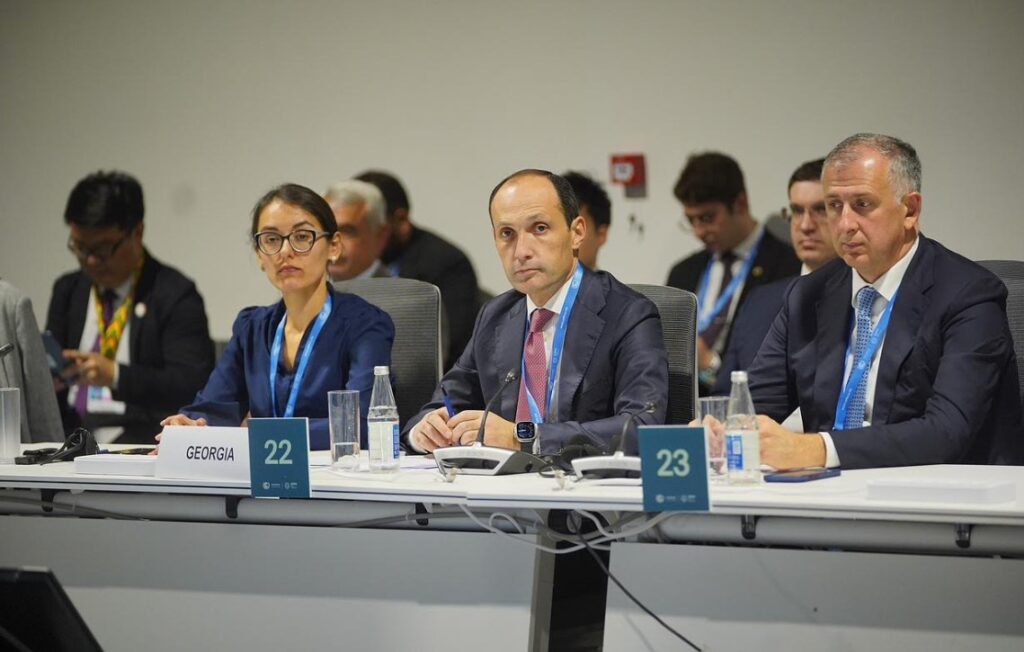Economy Minister: Georgia prioritizes enhancing Middle Corridor's resilience and infrastructure
First Vice Prime Minister and Minister of Economy and Sustainable Development Levan Davitashvili is participating in the ministerial conference titled “Sustainable and Digital Development in and Beyond the Middle Corridor” in Baku.
During his speech, Davitashvili highlighted the increasing significance of the Middle Corridor and Georgia’s role as a key connector between Europe and Asia.
The Minister emphasized that the Georgian government’s priority is to enhance the sustainability and resilience of the Middle Corridor through infrastructure improvements.
The ministerial conference is being held in the framework of the UN Climate Change Conference (COP29), organized in a roundtable format by Azerbaijan’s Ministry of Digital Development and Transport, the UN Economic and Social Commission for Asia and the Pacific (ESCAP), and the UN Economic Commission for Europe (ECE).
Representatives from nations along the Middle Corridor, EU countries, and international organizations are participating to discuss existing progress, future developmental prospects, and upcoming initiatives aimed at promoting sustainability and digitalization within and beyond the Middle Corridor.
During the roundtable discussion, representatives from regional countries will address several critical issues related to the Middle Corridor’s development, including creating green and resilient infrastructure, reducing freight transport emissions, and exploring innovations in transportation and digitalization. Topics will include the potential roles of smart transport systems, automation, and artificial intelligence in ensuring environmentally friendly and flexible transport connections.
First Vice Prime Minister Davitashvili provided an overview of Georgia’s current transportation and logistics sector, discussing growth trends and specific projects vital to the Middle Corridor’s functionality.
“Georgia’s transport and logistics sector has seen significant growth in recent years, with a 36% increase in 2022 and a further 13% in 2023. International transport flows through the country also rose, reaching 27 million tons last year. However, it is important to note that the transportation sector is one of the largest contributors to greenhouse gas emissions, highlighting the need for continued efforts aimed at greening the sector,” stated Levan Davitashvili.
The Minister focused on initiatives supporting the development of railway traffic and enhancing the Middle Corridor’s potential. He highlighted two major railway projects: railway modernization and the Baku-Tbilisi-Kars railway line. According to Davitashvili, both initiatives significantly improve the competitiveness of railway transport, one of the most environmentally friendly modes of transportation.
Moreover, he noted that the railway modernization process is nearing completion, which will reduce operational costs and increase the railway’s annual capacity from 27 million to 48 million tons.
“Additionally, the construction of the East-West highway is progressing well, with 70% already open for traffic. New roads are being built under European road safety standards. Furthermore, smart transport systems are being implemented to enhance the efficiency and management of the road network. The Anaklia Deep Water Port project is strategically significant, with an initial capacity of at least 600,000 containers (TEUs). This port will be equipped with the latest technologies and modern facilities that meet current standards,” highlighted the First Vice Prime Minister.
Davitashvili also emphasized that Georgia is a signatory to numerous UN agreements and conventions, solidifying its commitment to aligning with international transport standards and best practices. He reaffirmed Georgia’s readiness to collaborate closely with partner countries to make the Middle Corridor more sustainable, reliable, and attractive.

